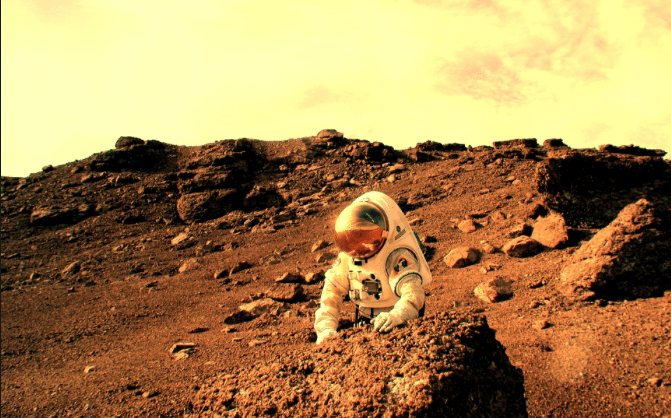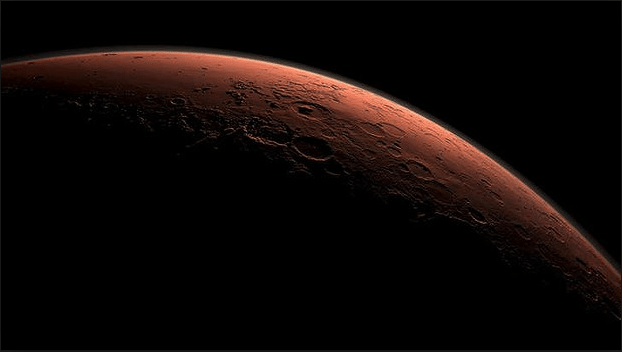Have you ever looked up at the planets and stars littering our night skies and wondered what it would be like to travel among them? To abscond from the familiars of our Mother’s green and blue cradle, and retrace an interplanetary narrative that began 4.5 billion years ago? Imagine your life, a rogue earthling, funneling through the starry abyss in an ambit of alien landscapes and bottomless pockets of unknown. How would you feel, leaving everything behind, without the gravity of correlation or context? Life, redefined by a whole new set of doctrines and languages would work to redefine you. The daily, leaping in a weightless state from one exotic to the next, fast becoming a series of inexplicable exploits. Perhaps you are consumed with a fearful sort of pride. After all, you were one among a few chosen to participate in a revolutionary, unprecedented human experiment, setting you on a one-way trajectory through space. Blazing trail for the rest of your species, you are a kind of martyr. You gave up a lot to be here. Walks in the rain, breeze on your face, sounds of birds, cars, airplanes – now the echoes of a past life that haunt an endless horizon of undulating rubble. Prints left in red dust by your space suit mark the successions of your own relativism. Nothing in space is absolute. It is the final frontier and the great leveler. Out here, humanity is not what it used to be. Instead, it is pared down to a thickening reduction. The flavour, always on the tip of your tongue, no matter how much hot water you add to the freeze fried mush you’ve been consuming for the past year. You don’t belong here, and yet, here you are – defying all odds in Total Recall tribute, living outside intuition and common sense by the paradox that gave birth to the dream of the red planet. The red planet. Mars. Your new home. Named after the Roman god of war, you get the sense he’s never too far away. Your eyes scan the combat zone of your new life. From the moment you landed, Mars has challenged you unlike you’ve ever been challenged before. Perhaps this place may just be your redeemer. Or maybe your destroyer. You think about the ones you left behind. A brother. Mother. Friends and family. Yourself. Sometimes they feel like figments of your imagination, belonging to another time and place, lost among the infinite layers of reality that line the space in between. You think about your home. Earth. Just 225,300,00 km away. Now that you’re finally here, it’s easier to put things into perspective, mostly because that perspective grows exponentially each and every moment that passes. There’s room now in your heart and mind for contravention. You are no longer in a fixed state, living perhaps for the first time, outside the confines and preconditions of your gender, age, race, ethnic origin, religion, and even your species. It’s a wonderfully frightful feeling. You’re free-falling with nothing to grasp but the expanding boundaries of your own consciousness. 
When we think about space travel and the more recent proposed human mission to Mars, Mars One, we can’t help but wonder what exactly this would mean, not just for the crew and its astronauts, but for humanity as a whole. Space travel and interplanetary and intergalactic resettlement has been the hot subject of science fiction for the last century, tweaking our imaginations and challenging our preconceptions about life, reality and evolution. Although many of us tend to think of space travel and colonization, as being reserved solely for bookshelves and the robust mind of the avid science fiction enthusiast, proposed human missions to Mars are not a new concept among the scientific community. In the early 1960s, Project EMPIRE, under NASA, directed studies aimed at creating detailed analyses of what it would take to accomplish a human voyage to Mars, and the Soviet Union’s Heavy Interplanetary Spacecraft, was part and parcel of a space exploration proposal to send a manned flight to Mars and Venus. In the 1990s NASA continued to develop several conceptual human Mars exploration architectures, which progressed in the 21st century. Today, however, a number of nations and organizations have outlined real, long-term intentions to send humans to Mars, the most current, and renowned, being the Mars One mission. Having gained considerable global media attention and public notoriety through sponsorship, high profile donations, merchandise, crowd funding and a proposal to launch a global reality TV media event, Mars One has dominated the news headlines since its inception in 2011. You may be asking yourself – who on earth would ever want to leave their home, their friends and family to gambit the rest of their life on a cold, hostile planet? Surprisingly, (or maybe not so surprisingly) when the online application process opened in April 2013 for those people wishing to be apart of the Mars One crew, the nonprofit was inundated with a flood of hopes and dreams that detailed leaving earth for a new life on Mars. The carefully selected “Mars 100” chosen from a total pool of 660 from around the world, comprise of 50 men and 50 women, some, middle aged and married with children, others, young and ambitious in the blossoming stages of their chosen career. All hold varying beliefs and motives for seeking an extra-terrestrial experience. Who are these people and what could they possible want to gain from leaving their home planet forever? Many have compared the Mars One mission to ancient cultures like the Vikings, who left everything behind in their homeland of Scandinavia to spend the rest of their lives in foreign settlements across Old World Europe. France may have felt just as formidable and alien to the Vikings as Mars would would be for us. And so, perhaps, rather than been appalled by this conclusion, we take stock of its truth. Human nature is driven by the ambition of inquisition and discovery. It is why our species has been so successful and it is what helps propel consciousness into new heights. Mars One is simply an extension of that: our ability to be counterintuitive and seek reason outside the comforts of our box, observing with the eyes and ears of a universe that is constantly affecting and changing. Within this context, human beings have been able to understand more than we ever thought possible, reaching beyond the outer limits of our senses and reason. In this respect, Mars One is a manifestation of our own character arch, with those appealing to its cause, echoing the sentiments of the hundreds of thousands who came before them. The Vikings, the Romans, the Greeks, the Mongols, leaders and lost empires of our history.

Should Mars One come to fruition, and no doubt, (whether within the proposed 15 year timeline or not), at some point, it will, reality of life on Mars will be drastically different than the ideal. For most people, living the rest of their lives in inflatable bubbles and Mars Suits seems like a far cry from the kind of leisurely retirement of golf, outdoor gardening, beaches and travel many of us aspire to. However, if you’re of the scientific sort, one who seeks inquiry and analysis, Mars One may just be up your alley. Astronauts are intended to spend much of their time engaged in research, investigating how their bodies respond and change within a 38% gravitational field, how food crops and other plants develop in hydroponic plant product units and will be required to engage in extra-settlement exploration, to learn about the ancient and current martian geology. Since the foundations of the mission plan were laid in 2011, the “Mars 100” crew have been selected and are now set to start their training this year. If we go by the timeline given to us by the Mars One project, by 2020 the Rover Mission will have landed on the red planet, establishing the necessary outposts to sustain life. By 2022 cargo missions will be launched, and a year later the outpost would become operational. 2024, the first wave of crew members are set to depart earth, landing a year later, with the second crew departing in 2026. There are, of course, many variables to consider, including the cost of sending people to Mars, health threats from exposure to high-energy cosmic rays and other ionizing radiation, the negative effects of a prolonged low-gravity environment on human health, psychological effects and equipment failure of propulsion or life-support systems, to name just a few. Not to mention the years of training involved and the eight month arduous journey the flight would take from earth, requiring its crew to give up their daily showers, live off freeze dried or canned food, put up with the constant noise of ventilators, computer and life support systems and adhering to a regimented three hour daily exercise routine. However, great things never happen on the back-end of skepticism, and so we must put it all into some kind of perspective. Of course there will always be the naysayers, the critics, the ones who have dogged history with their own scripture of cannot’s. But critics do not history make. Instead, we have seen success in the face of incredible odds at the vanguard of dreams and idealism. Taking a page, or in this case, many pages from antiquity, we see that nothing is truly impossible, and that the human spirit, strong in its faith in seeing the unseeable, defies preconception. So one day, perhaps not too far away, when we are looking out at the martian landscape through the eyes of those who chose to leave their lives on earth for something unknown, we can take that leap of faith into the unseeable, and refocus our vision, not only for ourselves today, but our world tomorrow.
The au natural philosophy of an unrefined goodness has a new-found integrity in our world of unprecedented materialism, mass production and manufactured synthetics. ...
Have you ever heard a whispering in the wind when climbing the gentle slope of Munson Mountain? Along the historic KVR trail, were ...
Why does the translation of autumn generously lend itself to a season of "giving thanks" and what exactly does that mean to us ...
Deer culling is a notorious debate that seemingly pits moral and ethical impetus against practical and convenient reasoning. It’s simply a question of ...

